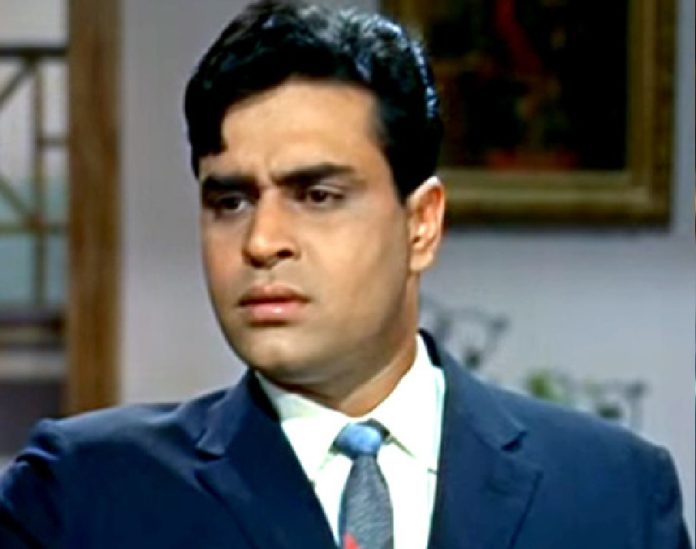“….JAANEWALE KI YAAD AATI HAI“
RAJENDRA KUMAR BIDS ADIEU
Jubilee star Rajendra Kumar Tuli, who dominated the film scene from the mid-fifties to the seventies, passed away on 12th July at 3.30 a.m. at Breach Candy Hospital, Bombay, where he had been admitted ten days earlier for respiratory and cardiac complications and a blood ailment. He was 71 and is survived by his wife, son Kumar Gaurav and two daughters.
The funeral, held the same afternoon at the Santacruz crematorium, was attended by a large number of film celebrities, friends and relatives including Sunil Dutt, B.R. Chopra, Yash Chopra, Ramanand Sagar, Amitabh Bachchan, Dharmendra, Mohan Kumar, Naushad, Feroz Khan, Randhir Kapoor, Rishi Kapoor, Manoj Kumar, Rakesh Roshan, Rajesh Roshan, Dara Singh, Chandrashekhar and others.
“Jaanewale kabhi nahin aate
Jaanewale ki yaad aati hai.”
One remembered these memorable lines of late Shailendra, during the final journey of the gentleman star Rajendra Kumar on July 12.
A partition refugee from Sialkot (Pakistan), Rajendra Kumar’s transition to stardom would read like a story of a comic-book hero. Those were the days when Dilip Kumar was the undisputed star. Rajendra Kumar appeared as an extra with Dilip Kumar in Mela (1948) and Devdas (1955) while working as an assistant to director H.S. Rawail. His passport to the industry was a letter of introduction for Rajinder Krishen.
Devendra Goel spotted Rajendra Kumar’s talent for acting and ventured to cast him as lead man in Vachan (1955). Fate ordained him with a spate of jubilees and successes beginning with director Vijay Bhatt’s Goonj Uthi Shehnai (1959), followed in the same year by Devendra Goel’s Chirag Kahan Roshni Kahan, B.R. Chopra’s Dhool Ka Phool (directed by Yash Chopra), director Kedar Kapoor’s Do Behnen and director Jyoti Swaroop’s Santan. There was no looking back after that. The hits that followed in later years were Aas Ka Panchhi, Gharana, Kanoon, Mere Mehboob, Gehra Daag, Sasural, Hamrahi, Aayee Milan Ki Bela, Dil Ek Mandir, Arzoo, Sangam, Zindagi, Suraj, Ganwaar, Gora Aur Kala, Aap Aaye Bahar Aayee, Anjana, Talash and Geet. He had also acted in Mehboob’s Mother India (1957) and a Gujarati super-hit, Mehendi Rang Lagyo (opposite Usha Kiron). Rajendra Kumar turned a producer with Love Story (1981) and launched his son, Kumar Gaurav, as the lead main in it. He had also produced Naam, Jurrat and Phool.
Rajendra Kumar, also known as Jubilee Kumar because a large number of his films turned out to be jubilee hits, was a wise investor. He constructed the Dimple preview theatre and personally used to oversee its maintenance. He also invested in film shooting equipments like cameras and lights. However, due to his simple and unostentatious lifestye, he was dubbed “tight-fisted”.
A well-known fact about Rajendra Kumar is that he was repeated by his producers in Bombay as well as in South, like B.R. Chopra (Kanoon and Dhool Ka Phool), S.S. Vasan of Gemini (Zindagi, Gharana and Shatranj), Sridhar (Dil Ek Mandir and Dharti), Ramanand Sagar (Arzoo, Geet and Lalkar), L.V. Prasad (Sasural and Hamrahi), Venus Krishnamoorthy (Suraj and Saathi), Devendra Goel (Vachan, Pyar Ka Sagar and Chirag Kahan Roshni Kahan), O.P. Ralhan (Gehra Daag and Talash) and Raj Kapoor (Sangam and Mera Naam Joker). Mohan Kumar made five films with him — Aas Ka Panchhi, Aayee Milan Ki Bela, Aman, Anjana and Aap Aaye Bahar Aayee — and the two remained great friends till the end.
Among the many who paid fulsome tributes to Rajendra Kumar were Naushad who said, “He was a simple-hearted gentleman and a talented actor.” Producer S. Raamanathan described him as “a man of fine human qualities, who was a great favourite with South producers. He used to be very co-operative and never behaved like an arrogant star.”
Prime minister Atal Behari Vajpayee condoled the death of Rajendra Kumar and expressed profound grief. I & B minister Pramod Mahajan expressed his grief saying, “The world of cinema has become poorer by his death.” State minister for I & B, Mukhtar Abbas Naqvi, said, “The death of the veteran actor, who swayed the emotions of the cinegoers, is a great loss to the industry.” B.R. Chopra, who cried when he visited Rajendra Kumar’s house on hearing the news of his demise, said that he (Rajendra Kumar) gave very good performances in his two films, Dhool Ka Phool and Kanoon. Mohan Kumar, a close friend of Rajendra, said, “I had worked with him in five films and all of them were hits. He took success in his stride and never let it go to his head. He was a great person and was liked by everyone.” Ramanand Sagar said, “I am proud that out of 25 silver jubilee hits he gave, I had a share of four precious films.” Ashok Kumar, who worked with Rajendra Kumar in a number of films, had a very close relationship with him and began to cry on hearing the news of his death. He said, “I have no words to express my feelings for him.” Shammi Kapoor paid his respects saying, “He was a fine person and a fine actor. The film industry is indebted to him for his immense contribution.”
LATEST POSITION
MANN suffered a lot on account of its poor editing. Yet, first week collections at many places were brilliant. The makers have deleted scenes and two songs (total running time reduced is 29 minutes) but the re-editing seems to have been effected too late in the day.
Mann began to drop mid-week. It is dull in Bihar, C.I. and Rajasthan. 1st week Bombay 66,51,187 (95.75%) from 12 cinemas; Ahmedabad 22,11,239 from 4 cinemas, Padra 2,23,513, Vapi 6,49,904, Rajkot (mat.) 54,505 (1 unrecd.), Jamnagar 1,65,683 from 2 cinemas (1 in matinee); Pune 14,73,353 from 4 cinemas (1 in mat.), Kolhapur 2,56,519, Solapur 3,99,085 from 2 cinemas, Sangli 2,03,000 (95%), Miraj 1,26,000 (92%), Islampur 1,72,151; Delhi 60,89,610 (93.17%) from 11 cinemas (1 on F.H.); Kanpur 6,47,423 from 2 cinemas, Lucknow 5,19,606, full, Agra 3,62,222, Allahabad 2,41,950, Meerut 2,77,311, Bareilly (6 days) 1,66,297 (64.04%), Hardwar 1,26,206, Saharanpur 2,00,006; Calcutta 42,63,319 from 24 cinemas; Nagpur 13,42,667 from 5 cinemas, Jabalpur (6 days) 2,00,062, Amravati (5 days) 2,13,474, Akola 2,51,770, Raipur (6 days; gross) 3,47,886, Durg 1,22,661, Jalgaon 2,75,325, Rajnandgaon (6 days) 1,03,000, Chandrapur 1,99,391; Indore 3,12,084 (3 cinemas on F.H.), Bhopal 1,89,993 (1 on F.H.); Jaipur 11,17,674 from 4 cinemas, Bikaner 2,42,328; Hyderabad (gross) 45,28,309 from 18 cinemas (2 in noon), total share of 7 districts is over 40 lakh; Vijayawada (gross) 2,98,998.
Khaufnaak Raat 1st week Bombay 5,23,420 (42.29%) from 4 cinemas; 2nd week Delhi 86,231.
Benaam 2nd week Bombay 3,93,205 (47.29%) from 4 cinemas; Ahmedabad 28,157; 1st week Pune 2,72,329 from 3 cinemas; 2nd Delhi 1,64,420 from 2 cinemas (2 on F.H.); Kanpur 30,189, Agra 39,131, Allahabad 15,885, 1st Bareilly 55,087 (24.64%); 2nd Calcutta 70,300; 1st Nagpur 1,50,115 from 2 cinemas; Bhopal 82,765; Bikaner 40,171.
Haseena Maan Jaayegi 3rd week Bombay 28,66,379 (71.14%) from 8 cinemas; Ahmedabad 6,54,095 from 6 cinemas, Rajkot 89,313, Jamnagar (mat.) 9,566 (1 unrecd.); Pune 6,04,186 from 4 cinemas (1 in mat.), Solapur 1,39,261 from 2 cinemas (1 in mat.); Delhi 26,91,866 from 8 cinemas (2 on F.H.); Kanpur 2,95,750 from 3 cinemas, Lucknow 2,95,804, Agra 2,20,000, Allahabad 1,35,547; Calcutta 2,34,674; Nagpur 98,004, Jabalpur 92,412, Amravati (6 days) 1,09,722, Akola (27 shows) 1,00,007, Raipur (gross) 1,70,295, Durg (gross) 41,484, Jalgaon 94,000; Indore 1,18,874 (1 on F.H.), Bhopal 2,08,263 from 2 cinemas; Jaipur 2,69,398, Ajmer 87,958, Bikaner 1,25,210; Hyderabad (gross) 6,03,599 from 4 cinemas.
Hum Dil De Chuke Sanam 4th week Bombay 49,39,255 (84.34%) from 11 cinemas; Ahmedabad 15,65,941 from 5 cinemas, Vapi 1,62,326, Rajkot 1,75,560 from 2 cinemas (1 in mat.), Jamnagar 70,364, Adipur 1,34,103; Pune 8,25,378 from 4 cinemas; Delhi 21,50,359 from 9 cinemas; Kanpur (6 days) 1,68,240 from 2 cinemas, Lucknow 3,86,898, Agra 2,05,011, Allahabad 80,622, Bareilly (6 days) 46,033; Calcutta 7,70,466 from 7 cinemas; Nagpur 1,55,534 from 2 cinemas, 2nd Jabalpur 2,45,967, 4th Amravati (6 days) 1,28,255, Akola 1,05,512, Raipur (6 days; gross) 1,76,697, 3rd Wardha 39,905, 4th Chandrapur 48,234; Indore 1,16,217, Bhopal 1,44,860; Hyderabad (gross) 4,46,865 from 3 cinemas (1 in noon).
Mahashaktimaan (dubbed) is fair. (Its English version, The Matrix, is excellent.) 1st week Ahmedabad 1,34,387 (57%), Baroda 93,412 (82%); Kolhapur 86,536 (35%), Solapur 1,33,263 (89%), Sangli 84,686 (46%), Ichalkaranji 68,731 (50%), Malegaon 53,966 (48%); Belgaum 65,356 (82%); Indore 77,896 (40%); Aurangabad 1,20,990 (49%).
_____
Bindhast (Marathi; tax-free) 4th week Bombay 11,80,793 (52.46%) from 8 cinemas; Pune 1,15,678, Solapur 46,237.
ADITYA PANCHOLI ARRESTED, FREED ON BAIL
Aditya Pancholi was put in police lock-up at Santacruz (Bombay) on the morning of 15th July for injuring two police constables in a car accident at 1.30 a.m. According to the police, Aditya Pancholi was driving in an inebriated state. He is said to have first hit the motorcycle of the police constables, then an autorickshaw and then a dumper truck. Pancholi told the police that he had not committed any criminal act and that it was an accident. He was freed on bail the same day.
BHOOMI PUJA OF TWO CINEMAS IN SHIVPURI
Premnarayan and Radheshyam Rathod alias Munia performed bhoomi puja for two cinemas at Shivpuri. The puja was performed at the hands of Gajanand Patel. Munia already owns Shriram Smriti, Jyoti Talkies and Satyam Talkies at Guna; Laxmi Mandir and Mahesh Mandir at Ashok Nagar; and Laxmi Talkies at Aron.
The two cinemas at Shivpuri will come up within six months, according to Munia, who is also planning to construct some more cinemas at other centres of C.I.
ASHOK VASHODIA APPOINTED SECRETARY TO HRITHIK
Ashok Vashodia has joined as secretary to Hrithik Roshan. He can be contacted on phone nos. 631-4362 (residence) and 649-2352/605-0393 (office). Cellphone: 98200-45797. Fax: 605-0391.
YOU ASKED IT
Which is the most ideal and cost-effective medium for a film’s release publicity?
– The most cost-effective is paper publicity but the most effective is, of course, the television medium.
What is the difference between the Kargil war heroes and our film heroes?
– While the Kargil hero fights for defending the line of control (LoC), the film hero fights for his price and knows no line of control!
What do you predict for the second half of the year?
– It will be good, very good. So relax!
Among the old-time directors, who is still going strong?
– Only Yash Chopra. Who else?
DO YOU KNOW?
* The already big screen of Metro, Bombay, will assume a bigger dimension for the screening of Subhash Ghai’s TAAL. The screen will become bigger by 33% in keeping with the film’s grandeur. The screen is being changed by the cinema after a gap of 42 years.
* After playing football in New Delhi, cricket stars will take on the Bengali film stars for the benefit of army jawans’ welfare on August 8 in Calcutta. Organised by Eastern India Motion Pictures Association (EIMPA) in collaboration with the Federation of technicians and workers of Tollygunge, the match will feature Mithun Chakraborty, Prasenjit, Ranjit Mullick and company on one side and cricketers Kapil Dev, Ajay Jadeja, Laxmi Ratan Shukla and, of course, Saurav Ganguly and company on the other. In Calcutta, it will be cricket.
* In an effort to show solidarity with our jawans in Kargil, producer K.P. Singh and director Kundan Shah called off a day’s shooting of HUM TO MOHABBAT KAREGA last week in Hyderabad, to participate in a special rally arranged by the Andhra Pradesh Film Chamber of Commerce. The entire unit, including stars Bobby Deol and Karisma Kapoor, spent the day collecting funds for the noble cause.
* For the first time ever in the history of Gujarati films, a father and son are being pitted against each other at the box-office. This week’s Gujarati releases have father Naresh Kanodia (in MAN SAAYBA NI MEDIYE) and son Hitoo Kanodia (in SENTHI NU SINDOOR)!
MIX MASALA
ACHIEVEMENT INDEED!
The other day, we received a telephone call from a rather jubilant producer of a Mithun starrer. “God, I am so happy!”, he gushed over the phone. We would have thought that his film had become a hit at the ticket-windows or something, but then… So, what was the reason behind his ecstacy, we probed. “My film has not run into a single delivery problem,” he exclaimed, adding, “Saari deliveries smoothly ho gayee. That’s cause for celebration.” Yes, if it’s a Mithun starrer these days, we guess, smooth deliveries themselves are an achievement!
Many Important Awards For Hindi Films
‘KUCH KUCH HOTA HAI’ BAGS NATIONAL AWARD
‘Godmother’ Picks up Six
Yash Johar’s Kuch Kuch Hota Hai, with which son Karan Johar made a remarkable debut as director, has bagged the National Award for the best popular film providing wholesome entertainment. It has also won the best singer (female) award for Alka Yagnik.
Shyam Benegal’s Samar has been adjudged the best film. It has also bagged the best screenplay award for Ashok Mishra.
Ajay Devgan shared the best actor award for his performance in Zakhm with Mammootty for his enactment of the title role in Dr. Babasaheb Ambedkar (English), directed by Dr. Jabbar Patel. Dr. Babasaheb Ambedkar has also bagged the best art direction award for Nitin Desai.
Godmother, directed by Vinay Shukla, won the best actress award for Shabana Azmi. The film also won the best feature film award in Hindi in the language category. It has won four other awards: best lyrics (Maati re maati) award for Javed Akhtar; best music for Vishal Bhardwaj; best singer (male) for Sanjeev Abhyankar; and best editing award for Renu Saluja. In all, Godmother has bagged six awards.
The Nargis Dutt award for the best film on national integration has been won by Zakhm, produced by Pooja Bhatt.
The best supporting actor award has gone to Manoj Bajpayee for Satya, and the best supporting actress award, to Suhasini Mulay for Hu Tu Tu.
Mani Ratnam’s Dil Se.. has won two awards: for best cinematography (Santosh Sivan) and for best audiography (R. Sridhar).
It is after a gap of several years that Hindi films in 1998 have bagged most of the important awards.
OTHER AWARDS
Besides winning the best cinematography award for Dil Se.., Santosh Sivan has bagged an award for direction for Malli (Tamil) which has been selected as the best environmental film. Malli has also won an award for child artiste baby Amma (Shwetha).
Rajeevnath has won the best director award for Janani (Malayalam). The Indira Gandhi award for the first film of a director has gone to Venu for Daya (Malayalam) which also won the best costume award for S.B. Satheesan.
The best children’s film award has been won by Virendra Saini for Kabhi Pass Kabhi Fail. Raja Sen’s Atmiyo Swajan (Bengali) has won an award for the best film on family welfare. Chintavishtayaya Shyamala (Malayalam) has got an award for portraying a woman’s struggle.
The 46th National Film Awards were announced at a press conference in New Delhi on July 16. Information and Broadcasting minister Pramod Mahajan and chairpersons of the various juries addressed the conference. Minister of state for I & B Mukhtar Abbas Naqvi was also present.
A record number of 114 feature and non-feature films in different Indian languages and English were viewed by a jury headed by D.V.S. Raju. Shaji N. Karun headed the non-feature jury. M.T. Vasudevan Nair headed the jury to select the best book on cinema and best cinema journalist.
BEST BOOK
In The Forest Hangs A Bridge won the best non-feature film award while Dr. Kishore Vaswani’s Cinemaee Bhasha Aur Hindi Samvaadon Ka Vishleshan was adjudged the best book on cinema. Meenakshi Shedde was chosen the best film critic.
3-E
Education-Entertainment-Enlightenment
Cut Short
Following the release of Mann last Friday, producer-director Indra Kumar and producer Ashok Thakeria took off for London and New York for the film’s premiere shows there. But after reaching London, Indra Kumar had to cut his trip short and return to India — to shorten the film! In keeping with the general consensus, Indra Kumar went a-trimming. And he finally effected cuts to the extent of 29 minutes! Two songs have been completely chopped off and scenes/shots of a total running time of 19 minutes have been thrown off.
Curiously enough — well, actually, not so curiously, after all — some distributors did not even wait for Indra Kumar’s advice. They exercised the cuts, apne mann se!
Operation Oppositions
Producers are wary of releasing their films in the face of oppositions. And what exactly constitutes an opposition? Well, for decades now, anything and everything, so to say, is construed an opposition to the box-office. Ramzan is an opposition, rains are an opposition, so are examinations, so is television, so are pre-Diwali days, so are Navratri days (especially in Gujarat and Maharashtra) and so also Ganpati festival (in parts of Maharashtra and, these days, in other states too). There are plenty of other oppositions too. But actually, after Vashu Bhagnani braved the World Cup cricket and brought his Biwi No. 1 in direct opposition of the event, is any opposition really an opposition? The collections of Biwi No. 1 were phenomenal all through the cricket days. That India did not enter the final could be one reason, but what about the days when India was still in the race? It would, therefore, be in the fitness of things if producers and distributors did some rethinking on the issue of oppositions and deduced whether it is actually right to keep their films away from the so-called oppositions and select release dates that don’t clash with the oppositions.
The ‘Taal’ Tale
When will Taal see release? And when should it be released? The answers to both the questions cannot be given definitively as of now because of the following given situation:
Subhash Ghai was in a fix whether to get Taal on August 6. His distributors insisted that Ghai should release Taal on 6th. That’s because if Taal were to be postponed, the distributors would have to let go of the chain of cinemas booked in their circuits and would, obviously, not be able to get a new chain that would be good enough, because of the line-up of releases.
So, Subhash Ghai, as of now, is determined to release Taal on 6th.
But exhibitors and others, who wish well for Subhash Ghai, are strongly of the opinion that Taal should not come on 6th. Why? They think that the promotion of ‘the beat of passion’ is yet to reach a crescendo which may not be possible till 6th August.
Many voices and whispers in the trade seem to strongly suggest, “Let the promotion be in sur and taal with the big canvas of the film!”
Dimple Luck
Rajendra Kumar’s daughter, Dimple, was undoubtedly his lucky mascot. And this can be proved by two examples. Before he built himself a new bungalow on Pali Hill, Bandra, he used to live in a bungalow on Carter Road, which was known as Dimple House. Till the time he lived in Dimple House, he rolled in great luck. One after the other, his films used to click and, as an actor, he was in great demand. It was only after he reluctantly sold the bungalow to Rajesh Khanna that Rajendra Kumar moved to his new bungalow at Pali Hill. Incidentally, when Rajendra Kumar sold the bungalow to Rajesh Khanna, he laid down a condition that the bungalow’s name be changed. Rajesh Khanna, therefore, changed it to ‘Aashirwad’. As fate would have it, Rajesh Khanna was to ultimately marry a girl named Dimple.
Much later, Rajendra Kumar constructed, with great love, the ultra-modern preview theatre, which he named ‘Dimple’, in his bungalow premises. This preview theatre is a great favourite of the industry folks even today.
It was a common sight to see the man taking a round of his preview theatre every evening and inspecting every nook and corner of the floor. If he found anything littered there, he would himself pick up the litter and throw it in the dustbin. Why, one even remembers seeing him keeping the bathroom slippers in their place! So much did he care for ‘Dimple’, the name that spelt luck for the jubilee star!
Title Of The Week
Bhooton Ka Honeymoon!
What The Left Hand Does…
So often do we observe — quite hilariously, might we add — how different government agencies take ridiculously contrasting stances on the same issue. Mahesh Bhatt’s Zakhm has bagged the Nargis Dutt National Award for 1998 for the best film on national integration. But wait a minute! How can that be? After all, wasn’t it another government agency — the CBFC, of course — which had not so long ago objected to the communal angle in the same film? Perhaps, there is some logic in the manner in which the government thinks, but try as we may, we fail to see any. Quite often, as in this instance, it seems to be just a case of — what the left hand does, the right hand does not know!
Gujarat Ma Hit Ne Halol Ma Jalso!
Lucky Studios at Halol (in Gujarat) looked decorated for a marriage. The excitement in the atmosphere was no less than what one witnesses at a weddinig. Well, in a way, the occasion was also a celebration of a marriage — top Gujarati film producer-director Govindbhai Patel’s marriage to success! For years now, the two — Govindbhai and Success — have lived like man and wife, inseparable, made-for-each-other.
After producing several hits almost in a row, Govindbhai delivered his biggest hit last year when his Desh Re Joya Dada Pardesh Joya hit the screens and simultaneously, the bull’s eye. The film went on to write new box-office history not just in Gujarat and Saurashtra but in Overseas, too. Not just the masses which usually patronise Gujarati films, this one, for the first time, also brought classes by the bulk to the cinemas. If the film became a blockbuster, its music, too, made the cash registers jingle as never before.
It was the celebration of the golden jubilee of Desh Re Joya Dada Pardesh Joya for which Lucky Studios on 13th July was bedecked like a bride. Govindbhai Patel, who turned a director with DRJDPJ, was a picture of humility as he, with his equally humble family, welcomed the guests who had come from all over Gujarat and Saurashtra to partake in the jubilee function which was preceded by the muhurt of Govindbhai’s next, Gaam Ma Piyaryu Ne Gaam Ma Sasaryu.
Rajeshbhai of Galaxy Pictures, Rajkot, sounded the clapper-board for the muhurt shot as Jeevanbhai Patel and Mrs. Govindbhai Patel cracked the auspicious coconuts, and Komal Nahta, editor of Film Information, switched on the camera. Govindbhai himself directed the first shot — a dramatic one — on Roma Manik and Hiten Kumar. The film stars four more heroes (Sameer Rajda and three others) and four other heroines of which one, Nandini, will be introduced in the film. Another new face in the film will be Heera alias Hiralal Thakkar who is a name to reckon with on Gujarati stage. Govindbhai had approached Alok Nath and Paresh Rawal for the role but, unable to get their bulk dates, he ultimately opted for Hiralal Thakkar and is more than happy with his choice.
Muhurt and lunch over, the latter part of the day was devoted to the jubilee celebrations. Govindbhai had got made trophies for every cinema where the film had had a meritorious run (and they were plenty) and every music shop which recorded outstanding sales of DRJDPJ audio cassettes, besides the film’s artistes, technicians and spot boys. Most of the trophies were presented by the lead pair of DRJDPJ, Roma Manik and Hiten Kumar. Govindbhai made an exception in the case of the trophy of late actor Narayan Rajgor who died last year following a freak accident on the sets of Desh Re Joya Dada Pardesh Joya. In fact, the function started with Govindbhai paying tributes to his “dear friend Narayan Kaka”. He could barely complete two sentences of his opening address when he burst into tears. In a quivering voice and with tears rolling down his cheeks, Govindbhai managed to convey to the audience that he would start off the trophy distribution function by personally presenting Narayan Kaka’s trophy to his son, Manish. A tearful Manish Rajgor came up on the dais and accepted the trophy even as several persons on the dais and in the audience were seen wiping their moistened eyes.
After the function, Govindbhai explained how thrilled he was because God had showered blessings on his new film in the form of rains which poured as soon as the muhurt shot was canned! Govindbhai also let us in to the secret of his success. “I do my home-work thoroughly before shooting begins,” he revealed and added, “God is great. He has been very obliging towards me.” And for GMPNGMS, Govindbhai will be immersed in its shooting for 50 days now. Before the shooting, he has had his script (story and screenplay are by Govindbhai himself, while the dialogues have been penned by Arvind Barot who is also the film’s lyricist and music director) cent per cent ready. Why, Govindbhai even plans to mix the film in Dolby sound, which will make this as the first Gujarati film in Dolby sound. For this, he has had detailed technical discussions so that due care may be taken while shooting. It was exhibitors D.Y. Pattani, Balaporia and Girishbhai, who prevailed upon Govindbhai to make his new film with Dolby sound. “The three of them volunteered to lend me some lakhs for the Dolby mixing and were willing to forgo the amount if the film did not do well when released!”, disclosed an ecstatic Govindbhai.
GMPNGMS will also be made in Marathi but Govindbhai will shoot the Marathi version after about 20 days of completing the Gujarati version’s shooting. And then, he will make the Rajasthani version of Desh Re Joya Dada Pardesh Joya. And one fine day, Govindbhai might just make a Hindi film too. “If I ever do so, it will be with Aamir Khan,” he smiles.
– Komal Nahta





























